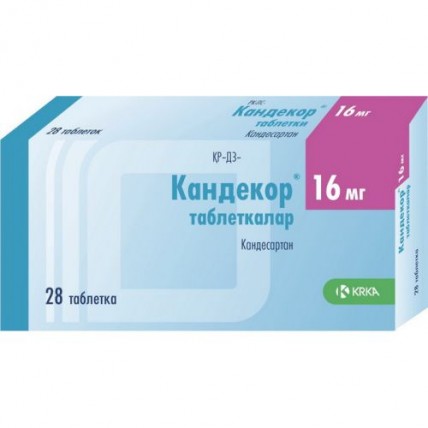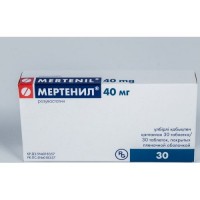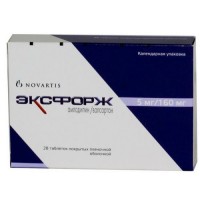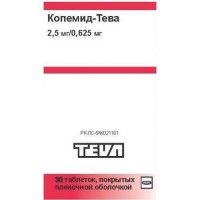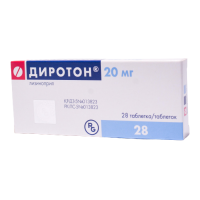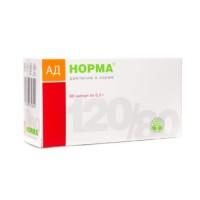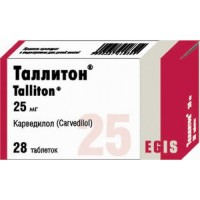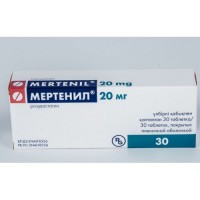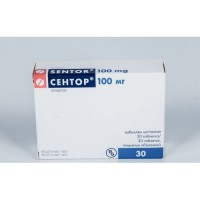Kandekor 16 mg (28 tablets)
- $19.80
The instruction for medical use
of KANDEKOR® medicine
the Trade name
of Kandekor®
the International unlicensed
name Kandesartan Lekarstvennaya a form
of the Tablet of 8 mg, 16 mg, 32 mg
Structure
One tablet contains
active agent: a kandesartana tsileksetit 8 mg, 16 mg or 32 mg
excipients: lactoses monohydrate, starch corn, hydroxypropyl cellulose, a macrogoal 8000, a karmelloza of calcium, ferrous oxide red E172, magnesium stearate
the Description
of the Tablet of round shape, slightly pink color, slightly biconvex, with risky on one party and slanted edges
Pharmacotherapeutic group
the Drugs influencing a system renin-angiotensin. Angiotensin II antagonists. Kandesartan
the ATX C09CA06 Code
tsileksetit the Pharmacological Pharmacokinetics Kandesartan properties
After intake, kandesartan tsileksetit turns into active agent kandesartan. The absolute bioavailability of tablets of a kandesartan after intake is 14%. Average maximum concentration in serum (Cmax) is reached in 3 - 4 hours after reception of a tablet. Concentration of a kandesartan in blood serum increases linearly with increase in a dose in a therapeutic interval dosed the Area under pharmacokinetic curve (AUC) a kandesartana in blood serum does not depend on meal. Gender differences in pharmacokinetics of a kandesartan are not observed.
Kandesartan quickly contacts proteins of plasma (more than 99%). The seeming volume of distribution of a kandesartan is 0.1 l/kg.
Kandesartan, is generally brought from an organism with urine and bile in an invariable look and only in insignificant degree is brought by hepatic metabolism (CYP2C9). Elimination half-life (Т½) the kandesartana makes about 9 hours. Cumulation of drug in an organism is not observed.
The general clearance of a kandesartan in blood is about 0:37 ml/min., renal clearance - about 0.19 ml/min. Kandesartan is brought by kidneys, by glomerular filtration and active canalicular secretion. After reception kandesartan tsileksetit, with urine in an invariable look about 26% of a dose and 7% of an inaktivny metabolite are removed while with excrements about 56% of a dose in an invariable look and 10% are removed - in the form of inaktivny metabolites.
At elderly people (65 years are more senior) Cmax and AUC of a kandesartan increases approximately by 50% and 80% respectively, in comparison with young patients. Nevertheless, reaction of arterial blood pressure and frequency of side effects after the entered dose of Kandekora® at patients of young and advanced age, are identical.
Patients with easy and moderate degree of a renal failure have Cmax and AUC of a kandesartan at a repeated dosage increase approximately by 50% and 70% respectively, but elimination half-life (T ½) does not change, in comparison with patients with normal function of kidneys. Corresponding changes at patients with heavy degree of a renal failure made about 50% and 110%, respectively. Terminal elimination half-life (T ½) a kandesartana at patients with heavy degree of a renal failure doubled. The pharmacokinetics at the patients who are on a hemodialysis remains the same, as well as at patients with heavy degree of a renal failure. At patients with easy and moderate degree of a liver failure the average AUC value of a kandesartan increases approximately by 23%.
The pharmacodynamics
Angiotensin II is the main vasoactive hormone renin-angiotensin-aldosteronovoy of a system and plays a part in pathogenesis of arterial hypertension and other cardiovascular diseases. It also plays an important role in pathogenesis of a hypertrophy and injury of extremities. Main physiological effects of angiotensin II, such, as: narrowing of blood vessels, aldosteronovy stimulation, regulation of a homeostasis of salt and water and stimulation of growth of cells which are transmitted through a receptor of 1 AT1 type.
Кандекор® is pro-medicine, at absorption from digestive tract it quickly turns into active agent kandesartan as a result of ether hydrolysis. Кандекор® is a selection antagonist of a receptor of angiotensin II, AT1 receptor, with strong binding and slow dissociation from a receptor. It has no affinity to a receptor. Кандекор® does not inhibit angiotenzinkonvertiruyushchy enzyme (AKF) which carries out transformation of angiotensin I into angiotensin II and destroys bradykinin.
Кандекор® does not connect and does not block other receptors of hormones or ion channels playing an important role at regulation of a cardiovascular system. The antagonism of receptors of angiotensin II (AT1) leads to dose-dependent increase in level of renin in plasma, the level of angiotensin I and angiotensin II, and to decrease in concentration of Aldosteronum in plasma.
In hypertensia, Kandekor® causes a dose-dependent, long lowering of arterial pressure. Antihypertensive action depends on decrease in system peripheric resistance, without reflex increase in heart rate. Signs of the serious or exaggerated hypotension case at an initial dose or converse effect after the treatment termination, it was not observed.
After reception of a single dose of Kandekora®, antihypertensive action begins within 2 hours. At continuous treatment, the majority of cases of a lowering of arterial pressure at reception of any dose, as a rule, is reached within four weeks and remains at long-term treatment. Average additive effect of increase in a dose of 16 mg up to 32 mg once a day insignificant. In view of interindividual variability, at some patients it is possible to expect more, than average effect. Reception of Кандекора® 1 times a day provides an effective and smooth lowering of arterial pressure within 24 hours with a small difference between the maximum and residual effect during a dosing interval.
Kandesartan is equally effective at patients irrespective of age and sex.
Kandesartan of a tsileksetil raises a renal blood stream and does not influence on it, or increases glomerular filtration rate at decrease in renal vascular resistance and filtrational fraction. At patients with arterial hypertension, with the accompanying diabetes 2 types and a microalbuminuria, antihypertensive therapy kandesartany tsileksetily reduces excretion of albumine with urine. Now data on influence of a kandesartan on progressing of a diabetic nephropathy, no. At patients with arterial hypertension with diabetes of the second type, 12 weeks treatment of 8 mg - 16 mg kandesartany tsileksetily do not make negative impact on glucose level in blood and a lipidic profile.
Heart failure
At patients with HSN and with reduced systolic function of a left ventricle (fraction of emission of a left ventricle ≤ 40%), kandesartan reduces the system vascular resistance and pressure of jamming in capillaries of pulmonary arteries, increases activity of renin in blood plasma and concentration of angiotensin II and also reduces Aldosteronum level.
Indications
- arterial hypertension
- chronic heart failure and disturbance of systolic
function of a left ventricle (with fraction of emission of a left ventricle
≤ 40%) as additional therapy to AKF inhibitors or
at their intolerance.
The route of administration and doses
of Kandekor® should be accepted once a day, regardless of meal.
Arterial hypertension
the Recommended initial dose and a usual maintenance dose - 8 mg once a day. The dose can be increased up to 16 mg a day. If arterial blood pressure is insufficiently controlled after 4-week treatment of 16 mg a day, a dose it is possible to increase to the maximum dose 32 mg a day. If at use of this dose the control of arterial blood pressure is not reached, it is necessary to consider the alternative
Therapy methods has to be selected according to reaction of arterial blood pressure. The majority of antihypertensive effects is reached within 4 weeks from an initiation of treatment.
If therapy of Kandekor® does not lead to a lowering of arterial pressure to optimum, it is recommended to transfer the patient to the combined Kandekora® forms (kandesartan / a hydrochlorothiazide)
it is not required From patients of advanced age of correction of a dose.
Patients with exhaustion of intravaskulyarny volume have a recommended initial dose of 4 mg.
At patients with impaired renal function, including patients on a hemodialysis - the recommended initial dose makes 4 mg. The dose has to be selected according to response. At patients with very heavy or an end-stage of a renal failure (clearance creatinine & lt, 15 ml/min.) experience of use is limited.
For patients with easy and moderate degree of a liver failure the recommended initial dose makes 2 mg once a day. The dose can be selected according to response. There is no experience of use for patients with heavy degree of a liver failure.
Chronic heart failure
the Usual recommended initial dose of Kandekora® makes 4 mg once a day. Increase to the planned dose of 32 mg a day or to the most maximum dose by doubling is allowed with an interval not less than 2 weeks.
Selection of an initial dose for patients of advanced age or patients with exhaustion of intravaskulyarny volume, a renal failure or easy moderate degree of a liver failure, is not required.
Кандекор® it is possible to apply in complex therapy of the heart failure including AKF inhibitors, beta-blockers, diuretics, drugs of a foxglove or a combination of these medicines.
Side effects
At treatment of arterial hypertension:
often (from ³1/100 to & lt, 1/10)
- respiratory infection
- dizziness / vertigo, a headache
- increase in the S-ALT (S-GPT) level, increase in content
of creatinine, urea or potassium and reduction of content of sodium
Sdrugy inhibitors renin-angiotensin-aldosteronovoy of a system was observed insignificant decrease in level of hemoglobin.
At treatment of heart failure:
often (from ³1/100 to & lt, 1/10)
- a hyperpotassemia, increase in level of creatinine, urea
- arterial hypotension
- a renal failure
During the post-marketing period:
very seldom (& lt, 1/10.000).
- a leukopenia, a neutropenia and an agranulocytosis
- a hyperpotassemia, a hyponatremia
- dizziness, a headache
- nausea
- increase in activity of liver enzymes, an abnormal liver function or hepatitis
- a Quincke's edema, rash, urticaria, an itching
- a dorsodynia, an arthralgia, myalgia
- a renal failure, including impaired renal function at predisposed patients
of the Contraindication
- hypersensitivity to active agent
and excipients
- pregnancy and the period of a lactation
- a heavy liver failure and/or a cholestasia
Medicinal interactions
of Clinically significant medicinal interaction with a hydrochlorothiazide, warfarin, digoxin, oral contraceptives (for example, ethinylestradiol/levonorgestrel), glibenclamide, nifedipine and enalapril was not revealed.
Kandesartan is brought only in insignificant degree by hepatic metabolism (CYP2C9). The antihypertensive effect of a kandesartan can be increased at the expense of other medicines with the reducing properties of arterial blood pressure, regardless of prescribing of antihypertensive drugs or other indications.
On the basis of experience of use of other medicines influencing renin-angiotensin-aldosteronovuyu a system, the accompanying use of kaliysberegayushchy diuretics, potassium additives, the substitutes of salt containing potassium or other medicines which can increase potassium level (for example, heparin) can lead to increase in level of potassium in blood serum.
At simultaneous use of lithium with APF inhibitors the reversible increase in concentration of lithium in blood serum and toxicity was observed. The similar effect can be observed at use of receptors of angiotensin II therefore at simultaneous use the careful control of level of lithium in blood serum is recommended.
At simultaneous use of antagonists of receptors of angiotensin II with non-steroidal anti-inflammatory drugs (NPVP), such as selection TsOG-2 inhibitors, acetylsalicylic acid (& gt, 3g/day) and non-selective NPVP, easing of antihypertensive effect can happen. Simultaneous use of receptors of angiotensin II and NPVP can result in the increased risk of deterioration in function of kidneys, including the suspected acute renal failure and also increase in level of potassium in blood serum, especially at patients with chronic kidney disease. It is necessary to appoint a combination with care, in particular to patients of advanced age. Patients have to drink enough water and it is necessary to carry out control of function of kidneys after the beginning of the accompanying therapy and periodically further. The bioavailability of a kandesartan does not depend on meal.
Special instructions
the Renal failure / transplantation of a kidney
As well as with other agents of inhibition system renin-angiotensin-aldosteronovoy, at susceptible patients to Kandekoru® can be observed changes in function of kidneys. At treatment of patients with arterial hypertension and a renal failure of Kandekorom®, periodic control of level of potassium in serum of blood and level of creatinine is recommended. At patients with very heavy or an end-stage of a renal failure (clearance of creatinine & lt, 15 ml/min.) experience of use is limited. At such patients it is necessary to title carefully a dose of Kandekora® and to carry out monitoring of arterial blood pressure.
The analysis of patients with heart failure has to include periodic assessment of function of kidneys, especially patients of advanced age have 75 years or are more senior also at patients with impaired renal function. During titration of a dose of Kandekora®, monitoring of level of creatinine and potassium in blood serum is recommended.
The accompanying therapy with AKF inhibitor in chronic heart failure
Risk of side effects, especially renal failure and a hyperpotassemia, can increase if kandesartan it is applied in a combination with APF inhibitor (see Section 4.8). Patients with such therapy have to be constant under careful control.
The hemodialysis
during dialysis arterial blood pressure can be especially sensitive to blockade of an AT1 receptor as a result of decrease in volume of plasma and activation system renin-angiotensin-aldosteronovoy. Therefore a dose of Kandekora® it is necessary to title and carry out carefully continuous monitoring of arterial blood pressure at patients on a hemodialysis.
A renal artery stenosis
At patients with a bilateral stenosis of renal arteries or a stenosis of an artery of the only kidney, other medicines influencing a system system renin-angiotensin-aldosteronovoy i.e. the angiotensin-converting enzyme (ACE), can raise urea of blood and creatinine of blood serum. The similar effect can be expected at reception of antagonists of receptors of angiotensin II.
Transplantation of a kidney
of Experience of use of Kandekora® for patients with recent transplantation of a kidney, no.
Hypotension
At patients with heart failure during treatment of Kandekorom® can arise hypotension. As well as with other agents acting on renin-angiotensin-aldosteronovuyu a system it can arise at patients with arterial hypertension with exhaustion of itravaskulyarny volume, and at those who receive high doses of diuretics. It is necessary to try to be careful at the beginning of therapy and correction of a hypovolemia.
Anesthesia and surgical intervention
during anesthesia and surgical intervention at the patients receiving antagonists of angiotensin II owing to blockade system renin-angiotenzinovoy, can arise hypotension. In rare instances, hypotension can be heavy that will demand use of intravenous injections and/or vazopressor.
A stenosis of an aorta and the mitral valve (subaortic hypertrophic stenosis)
As well as with other vazodilatator, patients should observe extra care, suffering from hemodynamically significant stenosis of an aorta or the mitral valve, or a subaortic hypertrophic stenosis.
Primary hyper aldosteronism
Patients with primary hyper aldosteronism do not react to the antihypertensive medicines operating by inhibition system renin-angiotensin-aldosteronovoy. In this regard, use of Kandekora® is not recommended.
The hyperpotassemia
on the basis of experience of use of other medicines influencing renin-angiotensin-aldosteronovuyu a system, the accompanying use of Kandekora® with kaliysberegayushchy diuretics, potassium additives, the salt substitutes containing potassium or other medicines which can increase potassium level (for example, heparin) can lead to increase in level of potassium in blood serum at patients with arterial hypertension. At the patients with heart failure receiving Kandekor® the hyperpotassemia can develop. During treatment of Kandekorom® at patients with heart failure, periodic control of level of potassium in blood serum is recommended, especially at its use along with APF inhibitors and kaliysberegayushchy diuretics, such as Spironolactonum.
Use for children and teenagers
due to the lack of data on safety and efficiency, to children and teenagers up to 18 years, is not recommended to accept Kandekor®.
General information
At the defining value of activity system renin-angiotensin-aldosteronovoy on a vascular tone and function of kidneys (for example in heavy stagnant heart failure or diseases of kidneys, including a stenosis of renal arteries), treatment by other medicines influencing this system including antagonists of receptors of angiotensin ІІ, was associated with acute hypotension, an azotemia, an oliguria and sometimes with an acute renal failure. As well as in a case with other antihypertensive drugs, the profound lowering of arterial pressure at patients with coronary heart disease or an atherosclerotic cerebrovascular disease can lead to a myocardial infarction or a stroke.
Patients with rare hereditary intolerance have galactoses, the lactose intolerance of Lapp or malabsorption of glucose galactose do not recommend to use this drug.
Features of influence of medicine on ability to driving of motor transport and potentially dangerous mechanisms
of Researches about influence of Kandekora® on ability to drive the car and potentially dangerous mechanisms, it was not carried out. During the driving or work with mechanisms, it is necessary to consider that sometimes, during therapy there can be dizziness or fatigue.
Overdose
Symptoms: profound arterial hypotension and dizziness.
Treatment: symptomatic treatment and carrying out monitoring of the vital functions. The patient it is necessary to put on a back with lifted upside down. If it will be not enough, the volume of plasma it is necessary to increase introduction of an infusional system, for example, isotonic saline solution. If above-mentioned measures are not sufficient it is possible to administer sympathomimetic medicines. Kandesartan is not brought by means of a hemodialysis.
The form of release and packing
On 14 tablets place in blister strip packaging from a film of polyvinylchloride/polyvinyldichloride and aluminum foil.
On 2, 4, 7 blister strip packagings together with the instruction for medical use in the state and Russian languages place in a pack from cardboard.
To Store storage conditions at a temperature not over 30 ºС.
To store out of children's reach!
A period of storage
2 years
not to apply after an expiration date
Prescription status
According to the prescription
the Producer
of KRK, of. The place is new, Slovenia
Shmaryeshka 6, 8501 the place, Slovenia
the Owner of the registration certificate
of KRK, of Is new, the Place, Slovenia
the Address of the organization accepting in the territory of the Republic of Kazakhstan claims from consumers on quality of products (goods) Representation "KRKA, tovarna zdravil, d.d., Novo mesto" in RKRK, 050059, Almaty, Al-Farabi Ave., 19, body 1b, the 2nd floor Is new. ph. 8 (727) 311-08-09факс 8 (727) 311-08-12
to Develop www.krka.si
of KANDEKOR® medicine
the Trade name
of Kandekor®
the International unlicensed
name Kandesartan Lekarstvennaya a form
of the Tablet of 8 mg, 16 mg, 32 mg
Structure
One tablet contains
active agent: a kandesartana tsileksetit 8 mg, 16 mg or 32 mg
excipients: lactoses monohydrate, starch corn, hydroxypropyl cellulose, a macrogoal 8000, a karmelloza of calcium, ferrous oxide red E172, magnesium stearate
the Description
of the Tablet of round shape, slightly pink color, slightly biconvex, with risky on one party and slanted edges
Pharmacotherapeutic group
the Drugs influencing a system renin-angiotensin. Angiotensin II antagonists. Kandesartan
the ATX C09CA06 Code
tsileksetit the Pharmacological Pharmacokinetics Kandesartan properties
After intake, kandesartan tsileksetit turns into active agent kandesartan. The absolute bioavailability of tablets of a kandesartan after intake is 14%. Average maximum concentration in serum (Cmax) is reached in 3 - 4 hours after reception of a tablet. Concentration of a kandesartan in blood serum increases linearly with increase in a dose in a therapeutic interval dosed the Area under pharmacokinetic curve (AUC) a kandesartana in blood serum does not depend on meal. Gender differences in pharmacokinetics of a kandesartan are not observed.
Kandesartan quickly contacts proteins of plasma (more than 99%). The seeming volume of distribution of a kandesartan is 0.1 l/kg.
Kandesartan, is generally brought from an organism with urine and bile in an invariable look and only in insignificant degree is brought by hepatic metabolism (CYP2C9). Elimination half-life (Т½) the kandesartana makes about 9 hours. Cumulation of drug in an organism is not observed.
The general clearance of a kandesartan in blood is about 0:37 ml/min., renal clearance - about 0.19 ml/min. Kandesartan is brought by kidneys, by glomerular filtration and active canalicular secretion. After reception kandesartan tsileksetit, with urine in an invariable look about 26% of a dose and 7% of an inaktivny metabolite are removed while with excrements about 56% of a dose in an invariable look and 10% are removed - in the form of inaktivny metabolites.
At elderly people (65 years are more senior) Cmax and AUC of a kandesartan increases approximately by 50% and 80% respectively, in comparison with young patients. Nevertheless, reaction of arterial blood pressure and frequency of side effects after the entered dose of Kandekora® at patients of young and advanced age, are identical.
Patients with easy and moderate degree of a renal failure have Cmax and AUC of a kandesartan at a repeated dosage increase approximately by 50% and 70% respectively, but elimination half-life (T ½) does not change, in comparison with patients with normal function of kidneys. Corresponding changes at patients with heavy degree of a renal failure made about 50% and 110%, respectively. Terminal elimination half-life (T ½) a kandesartana at patients with heavy degree of a renal failure doubled. The pharmacokinetics at the patients who are on a hemodialysis remains the same, as well as at patients with heavy degree of a renal failure. At patients with easy and moderate degree of a liver failure the average AUC value of a kandesartan increases approximately by 23%.
The pharmacodynamics
Angiotensin II is the main vasoactive hormone renin-angiotensin-aldosteronovoy of a system and plays a part in pathogenesis of arterial hypertension and other cardiovascular diseases. It also plays an important role in pathogenesis of a hypertrophy and injury of extremities. Main physiological effects of angiotensin II, such, as: narrowing of blood vessels, aldosteronovy stimulation, regulation of a homeostasis of salt and water and stimulation of growth of cells which are transmitted through a receptor of 1 AT1 type.
Кандекор® is pro-medicine, at absorption from digestive tract it quickly turns into active agent kandesartan as a result of ether hydrolysis. Кандекор® is a selection antagonist of a receptor of angiotensin II, AT1 receptor, with strong binding and slow dissociation from a receptor. It has no affinity to a receptor. Кандекор® does not inhibit angiotenzinkonvertiruyushchy enzyme (AKF) which carries out transformation of angiotensin I into angiotensin II and destroys bradykinin.
Кандекор® does not connect and does not block other receptors of hormones or ion channels playing an important role at regulation of a cardiovascular system. The antagonism of receptors of angiotensin II (AT1) leads to dose-dependent increase in level of renin in plasma, the level of angiotensin I and angiotensin II, and to decrease in concentration of Aldosteronum in plasma.
In hypertensia, Kandekor® causes a dose-dependent, long lowering of arterial pressure. Antihypertensive action depends on decrease in system peripheric resistance, without reflex increase in heart rate. Signs of the serious or exaggerated hypotension case at an initial dose or converse effect after the treatment termination, it was not observed.
After reception of a single dose of Kandekora®, antihypertensive action begins within 2 hours. At continuous treatment, the majority of cases of a lowering of arterial pressure at reception of any dose, as a rule, is reached within four weeks and remains at long-term treatment. Average additive effect of increase in a dose of 16 mg up to 32 mg once a day insignificant. In view of interindividual variability, at some patients it is possible to expect more, than average effect. Reception of Кандекора® 1 times a day provides an effective and smooth lowering of arterial pressure within 24 hours with a small difference between the maximum and residual effect during a dosing interval.
Kandesartan is equally effective at patients irrespective of age and sex.
Kandesartan of a tsileksetil raises a renal blood stream and does not influence on it, or increases glomerular filtration rate at decrease in renal vascular resistance and filtrational fraction. At patients with arterial hypertension, with the accompanying diabetes 2 types and a microalbuminuria, antihypertensive therapy kandesartany tsileksetily reduces excretion of albumine with urine. Now data on influence of a kandesartan on progressing of a diabetic nephropathy, no. At patients with arterial hypertension with diabetes of the second type, 12 weeks treatment of 8 mg - 16 mg kandesartany tsileksetily do not make negative impact on glucose level in blood and a lipidic profile.
Heart failure
At patients with HSN and with reduced systolic function of a left ventricle (fraction of emission of a left ventricle ≤ 40%), kandesartan reduces the system vascular resistance and pressure of jamming in capillaries of pulmonary arteries, increases activity of renin in blood plasma and concentration of angiotensin II and also reduces Aldosteronum level.
Indications
- arterial hypertension
- chronic heart failure and disturbance of systolic
function of a left ventricle (with fraction of emission of a left ventricle
≤ 40%) as additional therapy to AKF inhibitors or
at their intolerance.
The route of administration and doses
of Kandekor® should be accepted once a day, regardless of meal.
Arterial hypertension
the Recommended initial dose and a usual maintenance dose - 8 mg once a day. The dose can be increased up to 16 mg a day. If arterial blood pressure is insufficiently controlled after 4-week treatment of 16 mg a day, a dose it is possible to increase to the maximum dose 32 mg a day. If at use of this dose the control of arterial blood pressure is not reached, it is necessary to consider the alternative
Therapy methods has to be selected according to reaction of arterial blood pressure. The majority of antihypertensive effects is reached within 4 weeks from an initiation of treatment.
If therapy of Kandekor® does not lead to a lowering of arterial pressure to optimum, it is recommended to transfer the patient to the combined Kandekora® forms (kandesartan / a hydrochlorothiazide)
it is not required From patients of advanced age of correction of a dose.
Patients with exhaustion of intravaskulyarny volume have a recommended initial dose of 4 mg.
At patients with impaired renal function, including patients on a hemodialysis - the recommended initial dose makes 4 mg. The dose has to be selected according to response. At patients with very heavy or an end-stage of a renal failure (clearance creatinine & lt, 15 ml/min.) experience of use is limited.
For patients with easy and moderate degree of a liver failure the recommended initial dose makes 2 mg once a day. The dose can be selected according to response. There is no experience of use for patients with heavy degree of a liver failure.
Chronic heart failure
the Usual recommended initial dose of Kandekora® makes 4 mg once a day. Increase to the planned dose of 32 mg a day or to the most maximum dose by doubling is allowed with an interval not less than 2 weeks.
Selection of an initial dose for patients of advanced age or patients with exhaustion of intravaskulyarny volume, a renal failure or easy moderate degree of a liver failure, is not required.
Кандекор® it is possible to apply in complex therapy of the heart failure including AKF inhibitors, beta-blockers, diuretics, drugs of a foxglove or a combination of these medicines.
Side effects
At treatment of arterial hypertension:
often (from ³1/100 to & lt, 1/10)
- respiratory infection
- dizziness / vertigo, a headache
- increase in the S-ALT (S-GPT) level, increase in content
of creatinine, urea or potassium and reduction of content of sodium
Sdrugy inhibitors renin-angiotensin-aldosteronovoy of a system was observed insignificant decrease in level of hemoglobin.
At treatment of heart failure:
often (from ³1/100 to & lt, 1/10)
- a hyperpotassemia, increase in level of creatinine, urea
- arterial hypotension
- a renal failure
During the post-marketing period:
very seldom (& lt, 1/10.000).
- a leukopenia, a neutropenia and an agranulocytosis
- a hyperpotassemia, a hyponatremia
- dizziness, a headache
- nausea
- increase in activity of liver enzymes, an abnormal liver function or hepatitis
- a Quincke's edema, rash, urticaria, an itching
- a dorsodynia, an arthralgia, myalgia
- a renal failure, including impaired renal function at predisposed patients
of the Contraindication
- hypersensitivity to active agent
and excipients
- pregnancy and the period of a lactation
- a heavy liver failure and/or a cholestasia
Medicinal interactions
of Clinically significant medicinal interaction with a hydrochlorothiazide, warfarin, digoxin, oral contraceptives (for example, ethinylestradiol/levonorgestrel), glibenclamide, nifedipine and enalapril was not revealed.
Kandesartan is brought only in insignificant degree by hepatic metabolism (CYP2C9). The antihypertensive effect of a kandesartan can be increased at the expense of other medicines with the reducing properties of arterial blood pressure, regardless of prescribing of antihypertensive drugs or other indications.
On the basis of experience of use of other medicines influencing renin-angiotensin-aldosteronovuyu a system, the accompanying use of kaliysberegayushchy diuretics, potassium additives, the substitutes of salt containing potassium or other medicines which can increase potassium level (for example, heparin) can lead to increase in level of potassium in blood serum.
At simultaneous use of lithium with APF inhibitors the reversible increase in concentration of lithium in blood serum and toxicity was observed. The similar effect can be observed at use of receptors of angiotensin II therefore at simultaneous use the careful control of level of lithium in blood serum is recommended.
At simultaneous use of antagonists of receptors of angiotensin II with non-steroidal anti-inflammatory drugs (NPVP), such as selection TsOG-2 inhibitors, acetylsalicylic acid (& gt, 3g/day) and non-selective NPVP, easing of antihypertensive effect can happen. Simultaneous use of receptors of angiotensin II and NPVP can result in the increased risk of deterioration in function of kidneys, including the suspected acute renal failure and also increase in level of potassium in blood serum, especially at patients with chronic kidney disease. It is necessary to appoint a combination with care, in particular to patients of advanced age. Patients have to drink enough water and it is necessary to carry out control of function of kidneys after the beginning of the accompanying therapy and periodically further. The bioavailability of a kandesartan does not depend on meal.
Special instructions
the Renal failure / transplantation of a kidney
As well as with other agents of inhibition system renin-angiotensin-aldosteronovoy, at susceptible patients to Kandekoru® can be observed changes in function of kidneys. At treatment of patients with arterial hypertension and a renal failure of Kandekorom®, periodic control of level of potassium in serum of blood and level of creatinine is recommended. At patients with very heavy or an end-stage of a renal failure (clearance of creatinine & lt, 15 ml/min.) experience of use is limited. At such patients it is necessary to title carefully a dose of Kandekora® and to carry out monitoring of arterial blood pressure.
The analysis of patients with heart failure has to include periodic assessment of function of kidneys, especially patients of advanced age have 75 years or are more senior also at patients with impaired renal function. During titration of a dose of Kandekora®, monitoring of level of creatinine and potassium in blood serum is recommended.
The accompanying therapy with AKF inhibitor in chronic heart failure
Risk of side effects, especially renal failure and a hyperpotassemia, can increase if kandesartan it is applied in a combination with APF inhibitor (see Section 4.8). Patients with such therapy have to be constant under careful control.
The hemodialysis
during dialysis arterial blood pressure can be especially sensitive to blockade of an AT1 receptor as a result of decrease in volume of plasma and activation system renin-angiotensin-aldosteronovoy. Therefore a dose of Kandekora® it is necessary to title and carry out carefully continuous monitoring of arterial blood pressure at patients on a hemodialysis.
A renal artery stenosis
At patients with a bilateral stenosis of renal arteries or a stenosis of an artery of the only kidney, other medicines influencing a system system renin-angiotensin-aldosteronovoy i.e. the angiotensin-converting enzyme (ACE), can raise urea of blood and creatinine of blood serum. The similar effect can be expected at reception of antagonists of receptors of angiotensin II.
Transplantation of a kidney
of Experience of use of Kandekora® for patients with recent transplantation of a kidney, no.
Hypotension
At patients with heart failure during treatment of Kandekorom® can arise hypotension. As well as with other agents acting on renin-angiotensin-aldosteronovuyu a system it can arise at patients with arterial hypertension with exhaustion of itravaskulyarny volume, and at those who receive high doses of diuretics. It is necessary to try to be careful at the beginning of therapy and correction of a hypovolemia.
Anesthesia and surgical intervention
during anesthesia and surgical intervention at the patients receiving antagonists of angiotensin II owing to blockade system renin-angiotenzinovoy, can arise hypotension. In rare instances, hypotension can be heavy that will demand use of intravenous injections and/or vazopressor.
A stenosis of an aorta and the mitral valve (subaortic hypertrophic stenosis)
As well as with other vazodilatator, patients should observe extra care, suffering from hemodynamically significant stenosis of an aorta or the mitral valve, or a subaortic hypertrophic stenosis.
Primary hyper aldosteronism
Patients with primary hyper aldosteronism do not react to the antihypertensive medicines operating by inhibition system renin-angiotensin-aldosteronovoy. In this regard, use of Kandekora® is not recommended.
The hyperpotassemia
on the basis of experience of use of other medicines influencing renin-angiotensin-aldosteronovuyu a system, the accompanying use of Kandekora® with kaliysberegayushchy diuretics, potassium additives, the salt substitutes containing potassium or other medicines which can increase potassium level (for example, heparin) can lead to increase in level of potassium in blood serum at patients with arterial hypertension. At the patients with heart failure receiving Kandekor® the hyperpotassemia can develop. During treatment of Kandekorom® at patients with heart failure, periodic control of level of potassium in blood serum is recommended, especially at its use along with APF inhibitors and kaliysberegayushchy diuretics, such as Spironolactonum.
Use for children and teenagers
due to the lack of data on safety and efficiency, to children and teenagers up to 18 years, is not recommended to accept Kandekor®.
General information
At the defining value of activity system renin-angiotensin-aldosteronovoy on a vascular tone and function of kidneys (for example in heavy stagnant heart failure or diseases of kidneys, including a stenosis of renal arteries), treatment by other medicines influencing this system including antagonists of receptors of angiotensin ІІ, was associated with acute hypotension, an azotemia, an oliguria and sometimes with an acute renal failure. As well as in a case with other antihypertensive drugs, the profound lowering of arterial pressure at patients with coronary heart disease or an atherosclerotic cerebrovascular disease can lead to a myocardial infarction or a stroke.
Patients with rare hereditary intolerance have galactoses, the lactose intolerance of Lapp or malabsorption of glucose galactose do not recommend to use this drug.
Features of influence of medicine on ability to driving of motor transport and potentially dangerous mechanisms
of Researches about influence of Kandekora® on ability to drive the car and potentially dangerous mechanisms, it was not carried out. During the driving or work with mechanisms, it is necessary to consider that sometimes, during therapy there can be dizziness or fatigue.
Overdose
Symptoms: profound arterial hypotension and dizziness.
Treatment: symptomatic treatment and carrying out monitoring of the vital functions. The patient it is necessary to put on a back with lifted upside down. If it will be not enough, the volume of plasma it is necessary to increase introduction of an infusional system, for example, isotonic saline solution. If above-mentioned measures are not sufficient it is possible to administer sympathomimetic medicines. Kandesartan is not brought by means of a hemodialysis.
The form of release and packing
On 14 tablets place in blister strip packaging from a film of polyvinylchloride/polyvinyldichloride and aluminum foil.
On 2, 4, 7 blister strip packagings together with the instruction for medical use in the state and Russian languages place in a pack from cardboard.
To Store storage conditions at a temperature not over 30 ºС.
To store out of children's reach!
A period of storage
2 years
not to apply after an expiration date
Prescription status
According to the prescription
the Producer
of KRK, of. The place is new, Slovenia
Shmaryeshka 6, 8501 the place, Slovenia
the Owner of the registration certificate
of KRK, of Is new, the Place, Slovenia
the Address of the organization accepting in the territory of the Republic of Kazakhstan claims from consumers on quality of products (goods) Representation "KRKA, tovarna zdravil, d.d., Novo mesto" in RKRK, 050059, Almaty, Al-Farabi Ave., 19, body 1b, the 2nd floor Is new. ph. 8 (727) 311-08-09факс 8 (727) 311-08-12
to Develop www.krka.si
